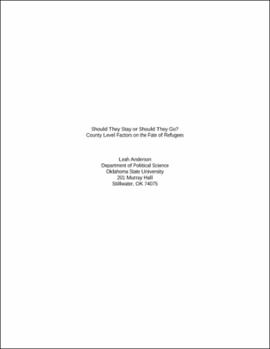| dc.description.abstract | With increasing internal conflict resulting in unprecedented numbers of refugees, countries are being asked to give more people asylum. While it is against Article 14(1) of the Universal Declaration of Human Rights (UDHR) to send refugees back to their home country before the end of a conflict, there are many cases of them doing so. To understand why this happens, past work has linked non-compliance in international treaties to three factors. One, that the treaty language was ambiguous, two, that the country does not have the capacity to carry out the treaty, or three that the social and economic changes in the country since the time of the treaty signing have created conditions adverse to the country carrying out the treaty responsibilities (Chayes and Chayes 1993). The main focus of this paper is to determine the conditions under which countries send refugees back to active conflict zone. Drawing from several different case studies that cite economic reasons as one of the main factors in several different refugee repatriations, I first predict that countries with limited economic resources are more likely to forcibly repatriate refugees into unsafe home countries. Drawing from research involving prejudice towards refugees as well as research involving ingroup and outgroup behavior, I next predict that countries whose citizens hold prejudice against refugees are more likely to forcibly repatriate refugees into unsafe home countries. In order to test our hypotheses, I tested GDP per capita as well as the percent of people in the country who reported they would not like to have immigrants as neighbors in the World Values Survey. I controlled for other country specific factors as well, such as level of democracy, GDP growth, type of legal system, and number of refugees received. | |
